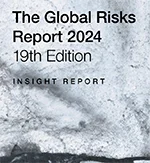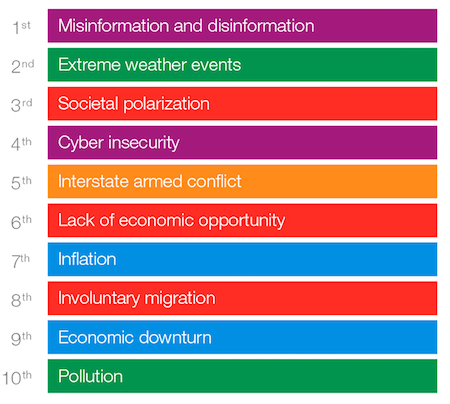 |
The world today faces a series of ever-present crises: war, climate change, inflation and a lingering pandemic to name a few. But according to the latest report published by the World Economic Forum, we now find ourselves confronting another: misinformation and disinformation, now exacerbated by the rapidly evolving rise of increasingly powerful artificial intelligence.
The World Economic Forum’s premier source of global risk data, the Global Risks Report explores the global risk landscape by gathering the opinions of 1,500 risk-identifying experts across academia, business, government, the international community and civil society in an effort to gather their perceptions of the potentially catastrophic risks that lie ahead.
For the first time in the survey’s 19-year history, misinformation and disinformation was ranked number-one by experts as having the most perceived risk severity among global risks over the next two years.
 |
| Global risks ranked by severity over the next two years. |
Extreme weather was ranked as the number-two short-term global risk. For the first time in 10 years, cyber insecurity also made it into the top-five list of short-term risks, ranking number four, behind societal polarization (number three) and ahead of interstate armed conflict (number five). Filling out the list of top-10 global risks were a lack of economic opportunity, inflation, involuntary migration, economic downturn and pollution, respectively.
The report defined “global risk” as “the possibility of the occurrence of an event or condition which, if it occurs, would negatively impact a significant proportion of global GDP, population or natural resources.”
Additionally, more than half (53 percent) of experts believe that AI-generated misinformation and disinformation is “likely to present a material crisis on a global scale in 2024,” second only to extreme weather (66 percent).
The report warned that misinformation and disinformation pose great threats from foreign and domestic actors seeking to widen societal and political divides, sowing mistrust in elections and increasing societal polarization, potentially creating a public discourse that invites some governments to respond with propaganda and censorship.
“As close to three billion people are expected to head to the electoral polls across several economies over the next two years, the widespread use of misinformation and disinformation, and tools to disseminate it, may undermine the legitimacy of newly elected governments. Resulting unrest could range from violent protests and hate crimes to civil confrontation and terrorism,” the report said. “In response to mis- and disinformation, governments could be increasingly empowered to control information based on what they determine to be ‘true.’ Freedoms relating to the Internet, press and access to wider sources of information that are already in decline risk descending into broader repression of information flows across a wider set of countries.”
However, the report noted that experts expect the perceived threat of misinformation and disinformation to wane somewhat over the next decade. When asked to rate the likely severity of global risks over the next 10 years. misinformation and disinformation slid to number five. Similarly, societal polarization falls to number-nine over the longer term. On the other hand, adverse outcomes related to AI technologies rose to sixth place over the 10-year period.
And while experts appear to be somewhat unanimous regarding misinformation’s threat in the short-term (with those working in academia and the private sector ranking it the number-one threat within the next two years and those working for international organizations and the government ranking it number two), over the long term, however, experts appear to be somewhat divided. Only experts working in academia view misinformation among the top-five threats over the next 10 years, while those in the private sector rank it number six, government experts rank it number eight and international organization experts rank it number nine.
Instead, experts identified extreme weather events to be the number-one risk in terms of severe global impact over the next 10 years.
According to the report, nearly two-thirds of experts polled (63 percent) “predict a turbulent or stormy outlook, with upheavals and an elevated risk of global catastrophes” within the following decade. About a third (30 percent) predict the same happening within the next two years.
The World Economic Forum’s 19th annual “Global Risks Report” presented the findings of the Global Risks Perception Survey, which polled 1,500 global experts across academia, business, government, the international community and civil society. Responses were collected between September and October 2023.


 There’s a fine line between newsjacking and taking advantage, aka ambulance chasing. Our job as PR professionals is to tread it carefully.
There’s a fine line between newsjacking and taking advantage, aka ambulance chasing. Our job as PR professionals is to tread it carefully. PR firms need to be mindful of ways their work product may be protected by the attorney-client privilege whenever working with a client’s internal legal team or its external legal counsel.
PR firms need to be mindful of ways their work product may be protected by the attorney-client privilege whenever working with a client’s internal legal team or its external legal counsel. Manuel Rocha, former US ambassador and intenational business advisor to LLYC, plans to plead guilty to charges that he was a secret agent for Cuba.
Manuel Rocha, former US ambassador and intenational business advisor to LLYC, plans to plead guilty to charges that he was a secret agent for Cuba. CEO mentoring is an often-overlooked aspect of why CEOs are able to make good decisions, and sometimes make bad ones—all of which intersects with the role and duties of a board.
CEO mentoring is an often-overlooked aspect of why CEOs are able to make good decisions, and sometimes make bad ones—all of which intersects with the role and duties of a board.  How organizations can anticipate, prepare and respond to crises in an increasingly complex world where a convergent landscape of global challenges, threats and risks seem to arrive at an unrelenting pace.
How organizations can anticipate, prepare and respond to crises in an increasingly complex world where a convergent landscape of global challenges, threats and risks seem to arrive at an unrelenting pace.


 Have a comment? Send it to
Have a comment? Send it to 
No comments have been submitted for this story yet.